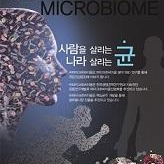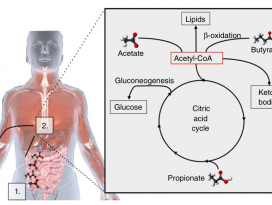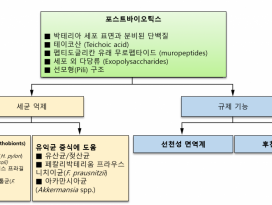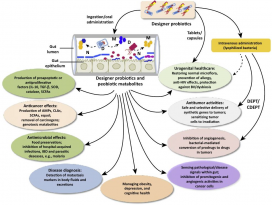[Postbiotics] Gut Microbiota: Impact of Probiotics, Prebiotics, Synbiotics, Pharmabiotics, and Postbiotics on Human Health
- e 1091
Chapter 36. Gut Microbiota: Impact of Probiotics, Prebiotics,Synbiotics, Pharmabiotics, and Postbiotics on Human Health
SaikiranChaluvadi, Arland T. Hotchkiss, Jr. and Kit L. Yam
| 3.3 Pharmabiotics and Postbiotics … The idea behind postbiotics is to include all bioactive functional molecules that can be used or produced by the microbial community for promoting health. Postbiotics produced by gut microbiota could be metabolites such as SCFAs from carbohydrates, indole from amino acids, gamma-aminobutyric acid from glutamic acid, and polyphenolic acids and other functional compounds derived from the diet. Metabolomics has been suggested as a method to identify postbiotics from biological systems (Klemashevich et al., 2014). Understanding postbiotics will help develop dietary intervention methods and bioactive functional food products to alter dysbiosis in the human gut microbiota. If postbiotics can be identified using metabolomic approaches, foods can either be fortified or processed to include these compounds. There are several foods that are naturally abundant in postbiotics or their precursors such as acids, vitamins, and polyphenols. Fermented food products such as yogurt, sauerkraut, pickled vegetables, and kombucha are classic postbiotic-rich foods. There are more than 4000 unique flavonoids in nature that can be derived from the diet. Most of these phenolic compounds remain unabsorbed in the gut. Complex interaction between these polyphenols and intestinal microbiota result in microbial transformation products. These products have been shown to repress the growth of pathogenic strains of Clostridium spp. while commensal bacteria were either less or positively affected (Lee et al., 2006). Long-term consumption of tea polyphenols correlated with body weight reduction in obese individuals. Bacteriodetes produce more glycosidases required to metabolize polyphenols giving them a selective advantage over the Firmicutes (Rastmanesh, 2011). Hence, it has been hypothesized that weight loss may result from restoration of the Firmicutes:Bacteriodetes ratio to that found in healthy counterparts (Rastmanesh, 2011). |
제목
36장. 장내 미생물: 인체 건강에서 프로바이오틱스, 프리바이오틱스, 신바이오틱스, 파마바이오틱스, 그리고 포스트바이오틱스의 영향
내용
(중략) 포스트바이오틱스의 배경은 건강 증진을 위해 미생물 군에 의해 사용되거나 생성될 수있는모든 생체 활성 기능 분자를 포함하기 위함이다. 장내에서 생성되는 포스트바이오틱스는 탄수화물에서 생성되는단쇄지방산 (Shot Chain Fatty Acids, SCFAs), 아미노산에서 나오는 인돌 (Indole), 글루탐산에서 나오는 감마아미노뷰티르산 (gamma-aminobutyricacid, GABA), 폴리페놀산 (polyphenolic acids) 그리고 섭취하는음식에서 나오는 기타 기능성 물질들이다. 대사체학 또는 메타볼로믹스 (Metabolomics)는생물학적 시스템에서 포스트바이오틱스를 확인하는 방법으로 제안되었다 (Klemashevich et al.,2014).
포스트바이오틱스를 이해하면 식이적 중재 방법과 생체 활성 기능성 식품을 개발하여 사람의 장내 미생물 불균형을 개선하는데도움이 된다. 포스트바이오틱스가 메타볼로믹스 접근법을 사용하여 확인될 수 있다면, 식품은 이러한 화합물을 포함하도록 강화되거나 처리될 수 있다.
포스트바이오틱스나 산, 비타민, 폴리페놀과같은 포스트바이오틱스의 전구체 물질이 자연적으로 풍부한 여러 가지 식품이 있다. 요구르트, 사우어크라우트(소금에 절인 양배추),절인 채소 및 콤부차(녹차, 홍차 등의 차를발효시킨 것)와 같은 발효 식품은 포스트바이오틱스가 풍부한 일반적인 식품이다. 자연에는 4000가지가 넘는, 식단에서얻을 수 있는 독특한 플라보노이드(식품에 널리 분포하는 노란색 계통의 색소)가 있다. 이들의 페놀 화합물의 대부분은 장내에서 흡수되지 않은 채로남는다. 이렇게 폴리페놀과 장내 미생물의 복잡한 상호 작용을 통해 결국 장내 미생물을 변화시키는 물질이생성된다. 이러한 산물은 클로스트리듐 (Clostridium) spp.의 병원성 균주의 성장을 억제하는 것으로 나타난 반면, 공생관계에 있는 균들은 영향을 덜 받거나 긍정적인 영향을 받았다 (Lee et al., 2006). 비만개체의 차(tea) 폴리페놀 장기간 섭취는 체중 감소와 상관 관계가 있다. 박테로이데테스 (Bacteriodetes)는 폴리페놀 대사에 필요한 더 많은 글리코시다아제 (glycosidases)를생산하여 퍼미쿠테스 (Firmicutes)에비해 비만 개체에게 선택적 이점을 제공한다 (Rastmanesh, 2011). 따라서 퍼미쿠테스 : 박테로이데테스 비율을 건강한 대조군에게서 발견된 비율로 복원하면 체중이 감소될 수 있다고 가정되고 있다 (Rastmanesh, 2011).
Keywords
: #Microbiome#Microorganisms#Microbes #Microbiota #GutMicrobiome #GutMicrobiota#GutMicrobes#Probiotics #Prebioitcs #Postbiotics #MetabolicByproducts #Metabolites
#마이크로바이옴 #미생물총 #미생물군 #미생물유전자 #장내미생물 #장내미생물총 #장내미생물군 #프로바이오틱스 #유익균 #프리바이오틱스 #포스트바이오틱스 #대사산물 #신진대사산물 #대사부산물
[출처: Ronald Ross Watson, Victor R. Preedy, 『PROBIOTICS, PREBIOTICS, AND SYNBIOTICS - BIOACTIVEFOODS IN HEALTH PROMOTION』, ELSEVIER (2016),p.515-523]
|
| ㈜마이크로바이옴 ㈜마이크로바이옴은 생명공학 최고의 기술력을 바탕으로 마이크로바이옴 산업의 성장과 발전의 선도적 역할을 하고 있는 대한민국 대표 마이크로바이옴 R&D 전문 기업입니다. ㈜마이크로바이옴은 생명공학 국가연구기관인 한국생명공학연구원과 마이크로바이옴 관련 상품에 대하여 공동연구개발 및 기술이전을 통하여 공동특허 출원과 마이크로바이옴 상품화에 성공하였고, 마이크로바이옴 글로벌 기업이 되기 위하여 연구개발을 지속하고 있습니다. |
㈜마이크로바이옴 ㅣ 서울시 서대문구 연희로 77-12 영화빌딩2층
Tel :02-322-0302 l Fax : 02-322-0759
Copyright (c) Microbiome. Co. All Rights Reserved.





